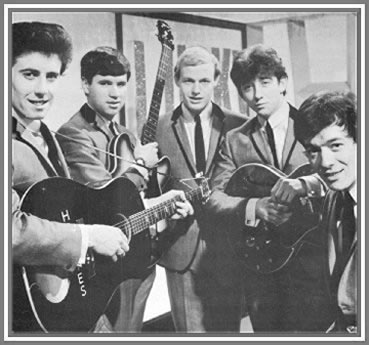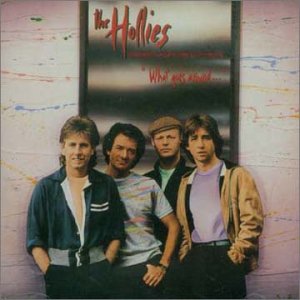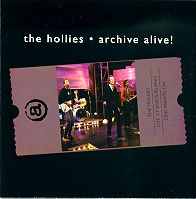|

Formed in Manchester in 1962 by childhood friends Allan Clarke (b. 15 April 1942,
Salford, Lancashire, England; vocals), and Graham Nash (b. 2 February 1942, Blackpool, Lancashire, England; vocals/guitar),
and named after the late Buddy Holly. They had already been singing together locally for a number of years as a semi-professional
duo under a number of names such as the Guytones, the Two Teens and Ricky And Dane. They enlarged the group by adding Eric
Haydock (b. 3 February 1943, Burnley, Lancashire, England; bass) and Don Rathbone (drums), to become The Fourtones and then
The Deltas.
Following the recruitment of local guitar hero Tony Hicks from the Dolphins (b. 16 December 1943, Nelson,
Lancashire, England) they became the Hollies. Almost immediately they were signed to the same label as the Beatles, the prestigious
Parlophone. Their first two singles were covers of the Coasters' '(Ain't That) Just Like Me' and 'Searchin''. Both made the
UK charts and the group set about recording their first album. At the same time Rathbone left to become their road manager
and was replaced by Bobby Elliott (b. 8 December 1942) from Shane Fenton (Alvin Stardust) And The Fentones. The group's excellent
live performances throughout Britain had already seasoned them for what was to become one of the longest beat group success
stories in popular music.
Their first two albums contained the bulk of their live act and both albums became long-time
residents in the UK charts. Meanwhile, the band was enjoying a train of singles hits that continued from 1963-74, and their
popularity almost rivalled that of the Beatles and Rolling Stones. Infectious, well-produced hits such as Doris Troy 's 'Just
One Look', 'Here I Go Again' and the sublime 'Yes I Will' all contained their trademark soaring harmonies. The voices of Clarke,
Hicks and Nash combined to make one of the most distinctive sounds to be heard in popular music.
As their career progressed
the aforementioned trio developed into a strong songwriting team, and wrote most of their own b-sides (under the pseudonym
'L. Ransford'). On their superb third collection, Hollies in 1965, their talents blossomed with 'Too Many People', an early
song about over-population. Their first UK number 1 came in 1965 with 'I'm Alive' and was followed within weeks by Graham
Gouldman 's uplifting yet simple take 'Look Through Any Window'. By Christmas 1965 the group experienced their first lapse
when their recording of George Harrison 's 'If I Needed Someone' just scraped the UK Top 20 and brought with it some bad press.
Both the Hollies and John Lennon took swipes at each other, venting frustration at the comparative failure of a Beatles
song. Early in 1966, the group enjoyed their second number 1, 'I Can't Let Go', which topped the New Musical Express chart
jointly with the Walker Brothers''The Sun Ain't Gonna Shine Anymore'. 'I Can't Let Go', co-written by Chip Taylor, had already
appeared on the previous year's Hollies and was one of their finest recordings, combining soaring harmonies with some exceptionally
strong, driving guitar work.
The enigmatic and troublesome Eric Haydock was sacked in April 1966 and was replaced by
Hick's former colleague in the Dolphins, Bernie Calvert (b. 16 September 1942, Brierfield, Lancashire, England). The Hollies
success continued unabated with Graham Gouldman's 'Bus Stop', the exotic 'Stop! Stop! Stop!' and the poppier 'On A Carousel',
all UK Top 5 hits, and (at last) became major hits in the US charts. The Hollies were quick to join the 'flower power' bandwagon,
as a more progressive feel had already pervaded their recent album, For Certain Because, but with Evolution, their beads and
kaftans were everywhere. That same year (1967) the release of the excellent Butterfly showed signs of discontent.
Inexplicably,
the album failed to make the charts in either the UK or the US. It marked two distinct types of songs from the previously
united team of Nash/Clarke/Hicks. On one hand there was a Clarke-influenced song, 'Charley And Fred', and on the other an
obvious Nash composition like 'Butterfly'. Nash took a more ambitious route. His style was perfectly highlighted with the
exemplary 'King Midas In Reverse', an imaginative song complete with brass and strings. It was, by Hollies standards, a surprising
failure (UK number 18). The following year during the proposals to make Hollies Sing Dylan, Nash announced his departure for
Crosby, Stills And Nash. His replacement was Terry Sylvester of The Escorts.
- Encyclopedia of Popular Music.
Copyright Muze UK Ltd. 1989 - 1998
|
 |
|

complete recordings of
the first six Hollies albums
the official website
a fan website apparently
authorized by Graham Nash
The Legacy

Related Links
Manchesters musical heritage
|
 |
|
|
 |
|
|
|

